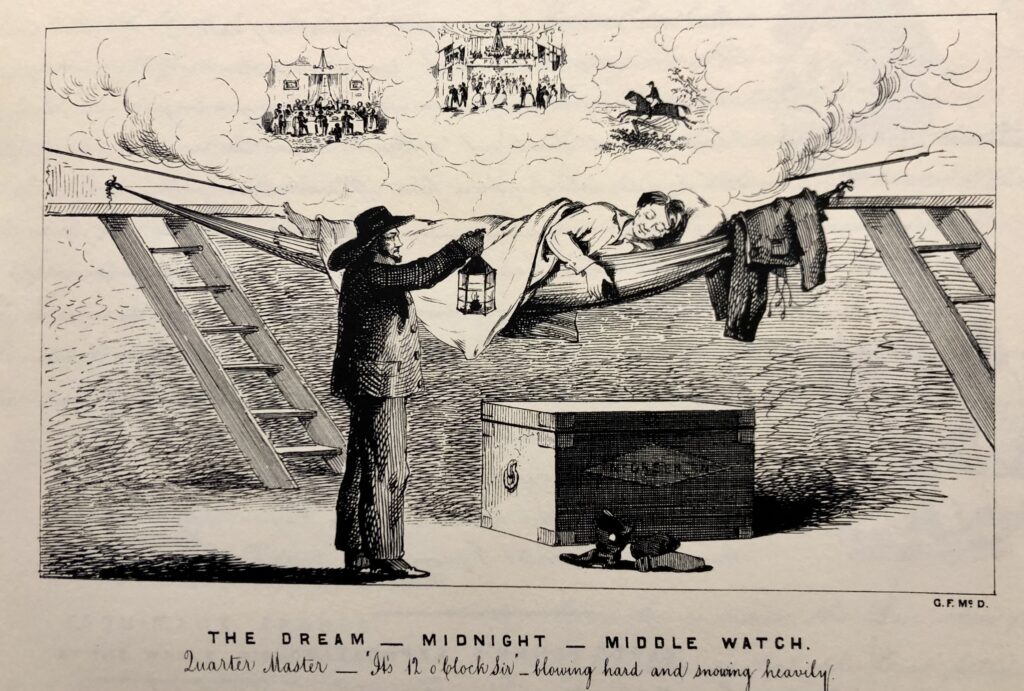Onboard HMS Resolute during the Belcher Expedition in 1852 George F. McDougall wrote about the hardest aspects of wintering in the Arctic. He put his pen to paper to write about his feeling on this day, the Winter Solstice, 21 December of 1852. I think we can all agree with at least some of what he expressed:
“The advent of the shortest day (the 21st) was welcomed with feelings of pleasure by all on board, for it was the turning point of the winter, when, although the temperature might reasonably be expected to increase in severity, the light, -that great and blessed gift of the Almighty- would gradually increase to a continued day of several months’ duration.
p. 168 The Eventful Voyage of HMS Resolute.
Indeed, of all the discomfort attendant on wintering within the Arctic Circle, none perhaps is so much felt as the absence of light, which changes the aspect of nature, by throwing a veil of gloom alike o’er hill and dale, and affects in a slight degree the human body, it is also injurious to the mind; the temper becomes irritable, the mental energies impaired, and the habits of some gloomy and solitary. But the sweet and soothing influence of memory, assisted by bright hopes for the future, tend to sustain the spirits, under the chilling influence of a position at once novel and unnatural, amidst eternal ice and snow…”

Twas the night before Christmas, when all through the house
Not a creature was stirring, not even a mouse.
The stockings were hung by the chimney with care,
In hopes that St Nicholas soon would be there.
The children were nestled all snug in their beds,
While visions of sugar-plums danced in their heads.
And mamma in her ‘kerchief, and I in my cap,
Had just settled our brains for a long winter’s nap.
When out on the lawn there arose such a clatter,
I sprang from the bed to see what was the matter.
Away to the window I flew like a flash,
Tore open the shutters and threw up the sash.
The moon on the breast of the new-fallen snow
Gave the lustre of mid-day to objects below.
When, what to my wondering eyes should appear,
But a miniature sleigh, and eight tiny reindeer.
With a little old driver, so lively and quick,
I knew in a moment it must be St Nick.
More rapid than eagles his coursers they came,
And he whistled, and shouted, and called them by name!
“Now, Dasher! now, Dancer! now, Prancer and Vixen!
On, Comet! On, Cupid! on, Donner and Blitzen!
To the top of the porch! to the top of the wall!
Now dash away! Dash away! Dash away all!”
As dry leaves that before the wild hurricane fly,
When they meet with an obstacle, mount to the sky.
So up to the house-top the coursers they flew,
With the sleigh full of Toys, and St Nicholas too.
And then, in a twinkling, I heard on the roof
The prancing and pawing of each little hoof.
As I drew in my head, and was turning around,
Down the chimney St Nicholas came with a bound.
He was dressed all in fur, from his head to his foot,
And his clothes were all tarnished with ashes and soot.
A bundle of Toys he had flung on his back,
And he looked like a peddler, just opening his pack.
His eyes-how they twinkled! his dimples how merry!
His cheeks were like roses, his nose like a cherry!
His droll little mouth was drawn up like a bow,
And the beard of his chin was as white as the snow.
The stump of a pipe he held tight in his teeth,
And the smoke it encircled his head like a wreath.
He had a broad face and a little round belly,
That shook when he laughed, like a bowlful of jelly!
He was chubby and plump, a right jolly old elf,
And I laughed when I saw him, in spite of myself!
A wink of his eye and a twist of his head,
Soon gave me to know I had nothing to dread.
He spoke not a word, but went straight to his work,
And filled all the stockings, then turned with a jerk.
And laying his finger aside of his nose,
And giving a nod, up the chimney he rose!
He sprang to his sleigh, to his team gave a whistle,
And away they all flew like the down of a thistle.
But I heard him exclaim, ‘ere he drove out of sight,
“Happy Christmas to all, and to all a good-night!”
 |